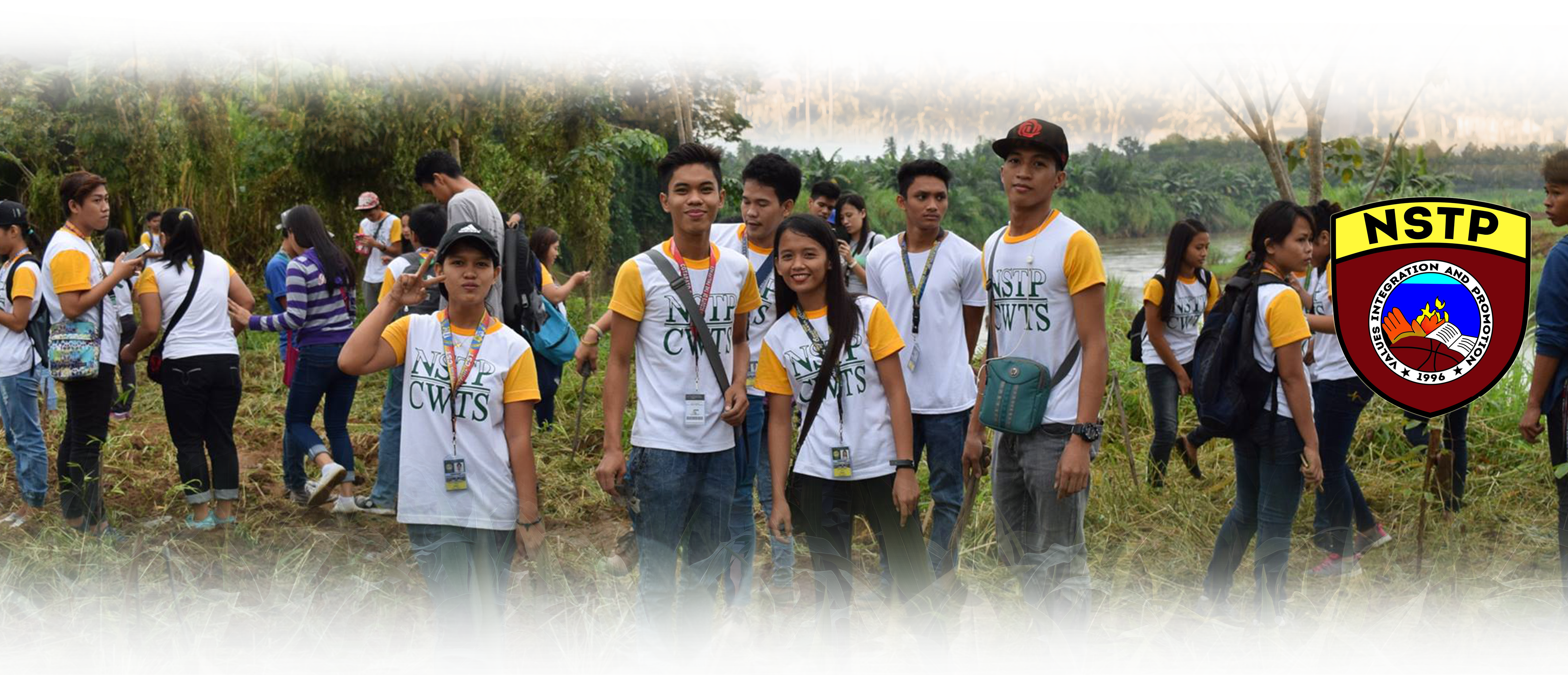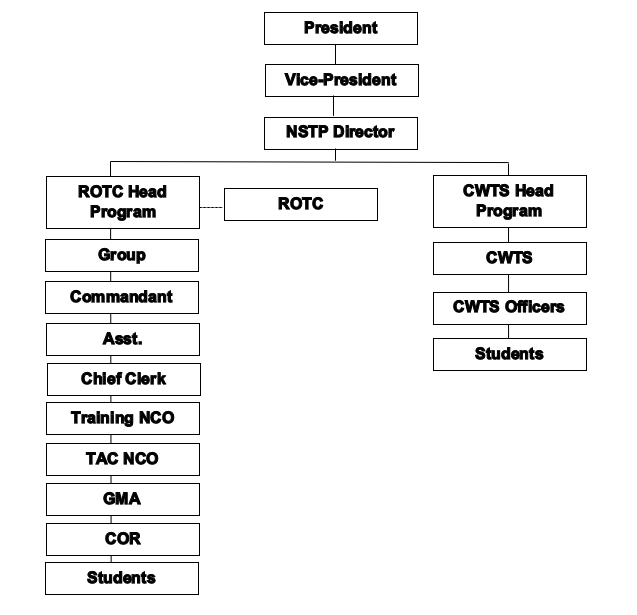
Vision
The NSTP envisions building up valuable and effective members of Citizen Armed Forces and National Service Reserved Corps who may serve as agents towards attaining quality of life, sustaining peace, unity, cooperation and growth of the target communities.
Mission
The NSTP is a dynamic service that provides capability enhancement for civil welfare geared towards encouraging youth in improving their skills, knowledge and attitudes on various endeavours developing their interest in community service and responsiveness in attaining peace towards nation building.
Values
- Love of GOD and humanity
- Patriotism and Self-discipline
- Genuine commitment for personal and social change
- Volunteerism
About NSTP
Republic Act No. 9163
Republic Act No. 9163, also known as the “National Service Training Program (NSTP) Act of 2001” declares the affirmed action of the prime duty of the government to serve and protect its citizens. In turn, it shall be the responsibility of all citizens to defend the security of the State and in fulfilment thereof, the government may require each citizen to render personal, military or civil service.
Recognizing the youth’s vital role in nation-building, the state shall promote civic consciousness among the youth and shall develop their physical, moral, spiritual, intellectual and social well-being. It shall inculcate in the youth patriotism, nationalism, and advance their involvement in public and civic affairs.
In pursuit of these goals, the youth as the most valuable resource of the nation, shall be motivated, trained, organized and mobilized in military training, literacy, civic welfare and other similar endeavours in the service of the nation.”
National Service Training Program
According to RA 9163, NSTP is a program aimed at enhancing civic consciousness and defense preparedness in the youth by developing the ethics of service and patriotism while undergoing training in any of its three (3) program components which are specially designed to enhance the youth’s active contribution to the general welfare.
NSTP Components
- Reserved Officers’ Training Corps (ROTC)
- A program institutionalized under Sections 38 and 39 of Republic Act No. 7077 designed to provide military training to tertiary level students in order to motivate, train, organize and mobilize them for national defense preparedness.
- Literacy Training Service (LTS)
- A program designed to train students to become teachers of literacy and numeracy skills to school children, out of school youth, and other segments of society in need of their service.
- Civic Welfare Training Service (CWTS)
- programs or activities contributory to the general welfare and the betterment of life for the members of the community or the enhancement of its facilities, especially those devoted to improving health, education, environment, entrepreneurship, safety, recreation and morals of the citizenry.
COVERAGE AND EXEMPTIONS
Students, both male and female, of any baccalaureate degree course or at least two (2)-year technical vocational courses in public and private educational institutions shall be required to complete one (1) of the NSTP components as requisite for graduation.
Exemptions apply to:
- Students who have already taken NSTP from a prior degree completed
- Transferees and shifters who have completed NSTP prior to transferring or shifting
- Foreign students or aliens
- as declared in R.A. 9163 that “it shall be the responsibility of all citizens to defend the security of the State”
DURATION AND EQUIVALENT COURSE UNIT
Each of the NSTP program components shall be undertaken for an academic period of two (2) semesters (NSTP 1 and 2) or an equivalent one-semester integrated (NSTP 1-2) course. The allotted time for NSTP classes per semester is 54 – 90 hours. Each class shall be treated as a normal class set-up, having 40 students per class and for additional students, multiplier will apply.
The whole NSTP program weighs six (6) units and should be taken for two (2) semesters taking up three (3) units each semester.
Management of the NSTP Components
The school authorities shall exercise academic and administrative supervision over the design, formulation, adoption and implementation of the different NSTP components in their respective schools; provided, that in case a CHED- or TESDA-accredited non-government organization (NGO) has been contracted to formulate and administer a training module for any of the NSTP components, such academic and administrative supervision shall be exercised jointly with that accredited NGO; provided, further, that such training module shall be accredited by the CHED and TESDA
The CHED and TESDA regional offices shall oversee and monitor the implementation of the NSTP under their jurisdiction to determine if the trainings are being conducted in consonance with the objectives of this Act. Periodic reports shall be submitted to the CHED, TESDA and DND in this regard.
PROGRAM STRUCTURE
NSTP starts with a common module. After the completion of the NSTP common module, the students may choose which NSTP component to take. The choices are LTS, CWTS, and ROTC. If a student wishes to change the component he/she has already enrolled to, the student has the option of changing the component of choice. There is a special change of matriculation period to be assigned a week after the last session of the NSTP common module, the change of matriculation is free of charge. Those who choose to continue in the class are redistributed from the generic NSTP class to the component class (CWTS1/LTS1/ROTC1).
NSTP 1 is a prerequisite of NSTP 2, and, as a University policy, NSTP 1 and 2 should be taken in the same college, otherwise, if a student should take his/her NSTP 2 component to another college, an appeal should be made in order to formalize the transfer.
NSTP GRADUATION
The NSTP graduation as a way of introducing NSTP-CWTS students to be a part of the National Service Corps (NSRC) may be tapped by the state for literacy and civic welfare activities through the joint effort of the DND, CHED and TESDA. The NSTP-ROTC graduates shall form part of the Citizens’ Armed Force, pursuant to republic Act No. 7077.
NATIONAL SERVICE RESERVE CORPS (NSRC)
NSRC is an organization composed of graduates of Civic Welfare Training Service (CWTS) and Literacy Training Service (LTS) components of the NSTP as mandated by Republic Act 9163.
All graduates of the NSTP (LTS and CWTS) are issued a serial number and form part of the NSRC. The NSRC is a pool of volunteers which may be tapped should there be dire need for literacy and civic welfare service in the country.
The NSRC Mission is to provide a trained, motivated and organized manpower reserve that can be tapped by the State for DRRM, civic welfare, literacy, national emergency, environmental protection and other similar endeavours in the service of the nation with the following functions:
- To assist in the disaster preparedness, mitigation, response and rehabilitation programs;
- To serve as an auxiliary to the Disaster Risk Reduction and Management Councils (DRRMCs) response units;
- To assist in the promotion of civic welfare activities;
- To assist in the implementation of literacy programs;
- To assist in socio-economic development;
- To respond in case of mobilization for national emergency;
- To assist in environmental protection; and
To perform other similar endeavors as directed by higher DRRM authorities.
PARTNER ORGANIZATIONS
Partner organizations are people from inside or outside of the University that aide in the implementation of community engagements of NSTP 2 classes. It can either be NGO, government or private institutions, student organizations, and the like.
All NSTP classes must make a list of their partner organizations for documentation, information and monitoring. Also, partner organizations should submit reports on NSTP activities they are involved in. This is to evaluate the performance of the NSTP class and monitor the effect of the class of their chosen community service.
FEES AND BUDGET
No fees shall be collected for any of the NSTP components except basic tuition which should not be more than fifty 50% percent of the charges of the school per academic unit. NSTP tuition collected shall constitute a Trust Fund, which shall be exclusively used for the operation of the program.
NSTP funds derived from NSTP-related operations shall serve as augmentation to sustain un-programmed activities of NSTP.
The unexpected fund balance shall be carried over to the next semester; provided, however, NSTP funds shall not be converted into savings at the expense of the proper implementation of the program.
Subsidized by the government, any legal agency or institution appropriated for NSTP shall be included in the preparation of the program of expenditure and report on the utilization of funds.
Expenditure/disbursements shall be subjected to periodic audits by the proper school authorities and concerned NSTP officers.
The NSTP Director or its equivalent shall submit a comprehensive report on the utilization of the NSTP by program component to the school head, two weeks after the end every semester.
Rental space of school and other similar expenses shall not be charged to NSTP.
END-OF-YEAR REPORT
Report on the accomplishments of the NSTP class every end of the semester shall be submitted to the NSTP office. The NSTP Director shall submit annual report and serial numbers to the CHED Regional Office.
It has been eighteen (18) years since Republic Act 9163 known as the National Service Training Act of 2001 was signed into law by the President on January 23, 2002 which became effective during the school year 2002-2003. the NSTP Act of 2001 aimed at enhancing civic consciousness and defense preparedness in the youth by the developing ethics of service and patriotism while undergoing training in any of its three (3) program components: (1.) The Reserved Officers Training Corps (ROTC), (2.) Literacy Training Service (LTS), and (3.) Civic Welfare Training Service (CWTS) specifically designed to enhance the youth’s active contribution to general welfare.
The University of Southern Mindanao is one SUC who started to implement the Republic Act 9163 known as the National Service Training Act of 2001 upon its effectivity in 2002-2003, with the two components with (1) ROTC and the (2) LTS for students to choose from. After a year, the school decided to have the ROTC and CWTS in lieu of LTS as the two component offerings of the NSTP in university until present.
As a unit of the university, NSTP primarily handles NSTP components undertakes for an academic period of two semesters to be credited 3 units which is equivalent to 90 training hours per semester, as basic requirement for graduation of all baccalaureate degree programs. The Civic Welfare Training Service (CWTS) is a program contributory to the general welfare and the betterment of life of the members of the community or the enhancement of its facilities, especially those devoted to improving health, education, environment, entrepreneurship, safety recreation and morale and other social welfare services. The Reserved Officer Training Corps (ROTC) is a program institutionalized under Sections 38 and 39 of Republic Act No. 7077 designed to provide military training to tertiary level students in order to motivate, train, organize and mobilize them for national defense preparedness.
Goals
Enhance civic consciousness and national defense preparedness among the youth particularly geared to develop their total well-being as agents towards nation building.
Objectives
- To promote civic consciousness among the youth;
- Develop the youth’s physical, moral, spiritual, intellectual and social well-being;
- Inculcate ideology of patriotism, nationalism, and set forward their involvement in public and civic affairs; and
- Motivate, train, organize and involve the youth in military, civic welfare program and other related endeavours in the service of the nation.
- Reserved Officer Training Corps (ROTC)
- Civic Welfare Training Service (CWTS)

